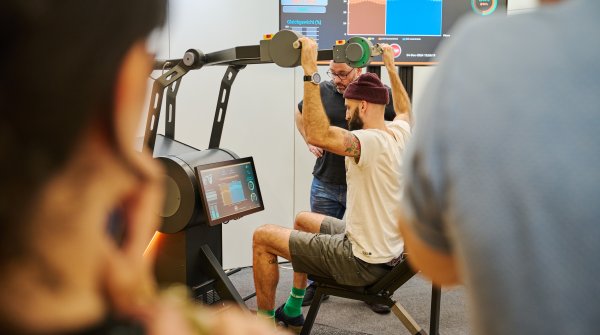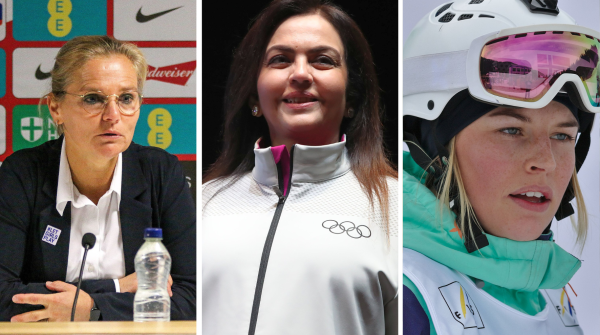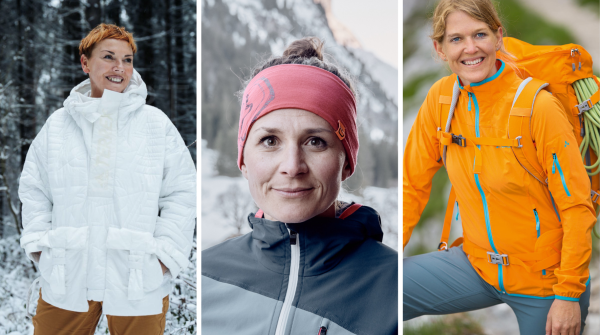Trigger warning! In the following we will talk about suicide. If you are affected by depression or suicidality, you can find help on 0800 1110111.
I'll have to elaborate a bit. I lost my leg due to a doctor's error after tearing my ligament in ballet when I was 15. Two years later, a mistake was also made during surgery. Everything was cut, and I was then hospitalized for eight years straight. After trying different treatments, the subject of amputation suddenly came up. I never wanted that. I never wanted to live like this.
The pain was so great that I attempted suicide several times. But I survived. I then deliberately shot myself up with morphine to forget the problems and because I couldn't cope with the fact that my leg was gone. I don't make a secret of that either, because it was simply my way. In the end, I kept going for my friends. Because they didn't care how many legs I was living with. The main thing was that I was alive. But from today's perspective, I'm glad about everything I did back then. No matter whether it was the conscious decision for treatment methods or the conscious decision to break eight cars.
And I'm proud that it gave me so much strength that I can now lead the life I lead. Because without that rocky road, I wouldn't have the life I have now. And that's where I'm proud that I've turned the corner, that I've worked this out for myself, that I've given my life meaning again. I thought to myself that if I choose to live, then I'll live right and do everything normally from one day to the next. And that's exactly what I did, even though it took a bit of courage to muster up the strength after all the experiences and say: I'll just give it a try and if I do, I'll do it 100%. And I'm proud of the fact that I succeeded.
And are there things you have failed at?
I wouldn't say that I've ever really failed. I did my studies, I live my life normally. I've done a lot of crap, sure, but everybody does that. I wouldn't even call that failing. I try to be relatively authentic, even to say when something doesn't work out or when I've made a mistake. That's a difficult question, I don't know if I have an answer to it.
That's a great mindset, when you don't see things as failures, but turn them into positives. It's actually nice when you don't have an answer.
Exactly. As I said, I've done plenty of crap, but since I did it consciously, I don't hold it against myself. I also never say I wouldn't do it the same way again. If I could turn back the clock now, I would go exactly this way again, even though it sucked. Because this path has made me the person I am. I see that as enrichment and I see that as freedom.
And what is your next big goal?
The biggest of my goals is simply that I stay healthy for a long time and that I can do what I love for a long time. And my goal is that I can reach a lot of people with the things that I do. Whether disabled or not disabled doesn't matter, just people. That I can be a motivator for everybody. Other than that, of course, mountain goals that are coming up next. In March I'm doing a project where I'm going ski touring, ice climbing is something I really want to try, and in the summer I have a big mountaineering project coming up.
Perfect! I'm a competition type. I also climb in the national team, so it's all about competition and you measure yourself there. But outside, I don't care what others do. Whether they are further, faster, higher. My partners also know that I don't allow myself to be lured, that I don't allow anything to be forced on me, that I don't allow myself to be bought. If I have an idea, if I want to do a project, if I'm up for something, then I do it. And I love what I do. If you are authentic to yourself, if you can laugh at yourself from time to time, or if you don't give in to this pressure to be better or faster, or to keep up with people without handicaps, then you keep the joy.
For me, professional sport is more of a passion. Of course, sometimes you have to do something you don't feel like doing, that's true in any job. But at the end of the day, I can say, "Hey, it's cool what I get to do."
Wow, that's a good question. Especially in professional sports, burnout, mind setting, existential fears are a big issue. The whole psychological level. That is completely hushed up. And it's certainly on the minds of the majority. But they don't talk about it, because of course it counts as a weakness, and in sports you don't show weakness. When it comes to mental health, the sports industry definitely has some catching up to do.
If you have something physical, if you have something visible, that always has more weighting than if you have something mental. I think, especially in the sports world, this is deliberately hushed up. If you have a torn muscle fiber in skiing or a torn cruciate ligament in soccer, that's no problem. That's just the way it is, because everyone has it. But if a professional athlete says the strain is too much, the training is too much, the partners are putting too much pressure on him or her, or a burnout is approaching, it's more difficult. Also because there is not so much money involved. Many don't see themselves in the position of being able to tell their partner that they're not doing well at the moment and can't manage something. It is simply demanded. And I think the athletes are aware that if they show weakness now, there are already five others who are just waiting for this position.
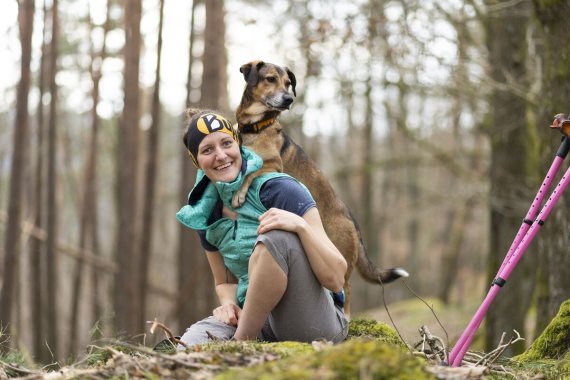
I think it's even more difficult in the outdoor industry. It's all about strength, everyone talks about mind setting, and if you say you've had a breakdown or a burnout, that's not cool, you look like a weakling in front of your colleagues. Especially when you see the mountain people, who want to convey strength. That also happened at some point when climbers talked about their fear. One of them opened his mouth, and then everyone did. Someone has to start and it has to be treated openly, because it's a job like any other and why shouldn't you have fears just because you go to the mountains or because you do any outdoor sport.
Anything. Just do something. So there's nothing, so there's nothing happening. Everybody talks about it, but nobody follows through. Although I don't understand it. When I first started, my first partnership was with a shoe company. And they said to me how cool that is, because everyone is looking at your feet, I only have one. That draws the eye and then you just see the shoe. Full of good thoughts somehow. When you scroll through pictures on Instagram, everything is the same: mountains, women, men. But then you scroll and suddenly someone is sitting in a wheelchair or only has one leg or only one arm and you scroll back. Did I see right there? And then people are interested. Companies can play with that much more! Especially since nothing is done here anyway. You stand out and stand out from others.
But it is difficult to relate inclusion to an industry, because something would have to change fundamentally. From the top, we don't need to start in the outdoor industry if the government and the attitude of mankind are not yet ready. It will take years before something gets there. That sounds crass now, because there are barrier-free hotels, there are ramps for wheelchair users or click signs at traffic lights. But for me, it's actually completely normal.
We disabled people are just like the non-disabled. We are all human beings. You have a broad mass of people like men and women, and you don't just make men's clothes or just women's clothes, but there are both. These are people, and that includes the disabled. So you don't really have to discuss whether you do something extra, because the people are already there, they don't have to be invented first. That should always be done as standard in all areas. It has to become more normal in society and then the industries will automatically follow suit. And that's what I'd like to see, that at some point we'll get to the point where someone without arms, without a leg, with three heads, can walk along and be perceived in the same way as someone with dreadlocks or a glitter outfit. They get looked at too, but it's not made an issue of. How someone looks, what hairstyle he has, what he wears, if he has any body parts too much or too little, it doesn't matter, it's just a person, done. And that's my point, but we're not there yet, and in the outdoor industry or the sports industry, I think that's a thing of the future. But once we've got that far, we won't have to worry about it within the industry, because it will happen automatically.
I'm firmly convinced of that, but unfortunately it will still take time.
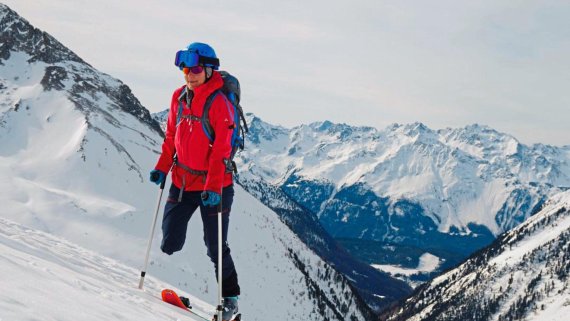
That they are much, much more open. That they are not so judgmental, more open, more empathetic towards others. That people stop judging each other because of the way they look or because of things they do. Live and let live. Even if you don't like something, you should accept each other. That you can just say, "Hey, he's doing it in a way that I wouldn't do it, but that's okay!" And I think then that's a good basis that you get along better. Because if we continue the way we've been doing it so far, I think it's going to lead in the wrong direction.
- Awards
- Mountain sports
- Bike
- Fitness
- Health
- ISPO Munich
- Running
- Brands
- Sustainability
- Olympia
- OutDoor
- Promotion
- Sports Business
- Textrends
- Triathlon
- Water sports
- Winter sports
- eSports
- SportsTech
- OutDoor by ISPO
- Heroes
- Transformation
- Sport Fashion
- Urban Culture
- Challenges of a CEO
- Trade fairs
- Sports
- Find the Balance
- Product reviews
- Newsletter Exclusive Area
- Magazine


